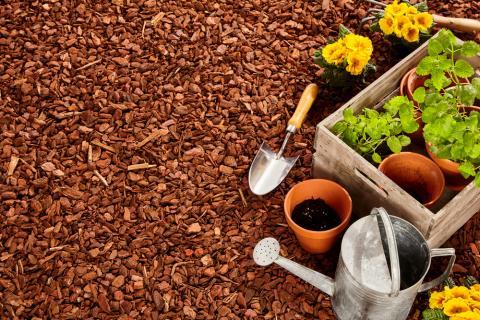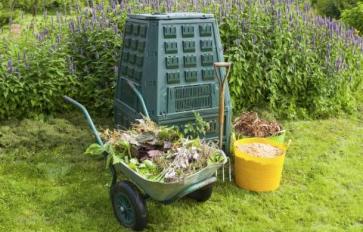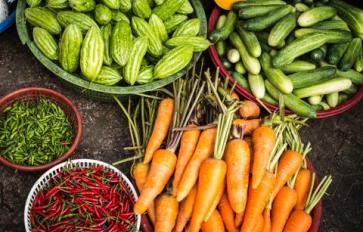
Mulching is an essential but oft underrated gardening tool. Let’s discuss some mulching recipes that are born of nothing but trash that even an amateur gardener can easily get to.
What does mulching do, and why should you do it? Mulching retains moisture so it’s a great tool for the dry season. It helps to maintain a warmer soil temperature and insulates plant roots, so it’s a great growing tool for the cold season. And finally, if you use appealing enough mulch, it adds great visual appeal to your garden.
Commonly used mulch are wood chips, pebbles and rocks – while the former needs to be reapplied since it degrades within a season, the latter two do not degrade and so are rather economical, but need regular fertilization since they don’t add any to the soil by themselves. Here’s what you can do to mulch your soil from waste lying around. Some of these you can make yourself, while some need to be bought commercially. Weigh the pros and cons of each, and then make your decision as per time, economics and soil requirements.
Homemade Mulches
Dry Leaves
Pros: Deciduous trees shed and those leaves can be turned into great mulch, instead of being a perennial problem. Just remember to shred the leaves if using them as a soil covering, and spread them thinly, especially on seed beds or seedlings.
Cons: Spread thickly or left whole, wet leaves can actually inhibit the growth of plants. Also since they will degrade, they need to be reapplied every season.
Grass Clippings
Pros: Grass clippings can be excellent mulch for your lawns in the cold or dry season. Many mowers have a mulching option that simultaneously shreds and spreads the grass onto the lawn as you mow it.
Cons: If you want to use grass clippings as mulch for other plants, dry them out first, else they will insulate the plants a little too well and basically kill them on the spot.
Cardboard & Newspaper
Pros: Since they are already dry, they just need to be shredded (think packing paper) before being used as mulch. You can mix them with other kinds of organic mulch to increase the shelf life and also act as an excellent weed barrier.
Cons: Treated cardboard and glossy, colored newspaper should be avoided since they tend to have chemical additives in them which may leach into the soil. Normal black newsprint and ordinary cardboard work best.
Crushed Egg Shells
Pros: A great mulch or mulch additive, eggs shells are great for the soil since they are crucial for worm reproduction. They add calcium to the soil and also help in aeration.
Cons: Frankly, they are a bit smelly so make sure you wash your eggs shells with plenty of water and a little vinegar to take away the smell. Dry them out and crush them in a bag before spreading them – all this is a bit time consuming, to say the least.
Used Coffee Grounds
Pros: There’ll be plenty of these if you have a coffee aficionado in the house, and since they are rich in nitrogen, they make great mulch for veggies. Plus, they tend to look and smell good (yep, coffee lover here).
Cons: Collecting them, drying them and then spreading them is a bit tedious, but oh so satisfying once done.
Nut & Seed Shells
Pros: If you love chomping on nuts and seeds – don’t discard the shells for they make an excellent and rather attractive mulch. All you have to do is wash off any seasoning, dry them and just spread them across the soil.
Cons: Since nuts shells degrade rather slowly, chances are they will get mixed into the soil the next time you plough the bed. Plus collecting and keeping them is a bit of a hassle.
Commercially Bought Alternatives
Rubber Mulch
Pros: Made from 100% recycled rubber, usually from old tires, rubber mulch is a great insulator from heat and cold. And since it is non-porous, all the water reaches the soil undisturbed. It’s a good weed barrier and also keeps harmful fungi in check.
Cons: Rubber does not decompose and so does not offer the soil any nutritional benefit. It can also leach some chemicals into the soil, so it’s best used in non-edible plants.
Organic Mulch
Pros: Organic mulches are made from organic waste material collected from various food and agricultural industries. The biggest benefit of these mulches is that they decompose naturally and so offer the soil great nutrition.
Cons: Since they deteriorate, they have to be reapplied every season, at a cost.
Pine Mulch
Pros: Pine needle mulch or pine straw is another commercially available organic mulch that’s easy to spread on the ground, gives the soil plenty nutrients, lets water and oxygen through, and also insulates the roots from the cold.
Cons: Pine needles are acidic and so will work best with plants that thrive in an acidic soil like gardenias, holly, roses, tomatoes, garlic and onions.
Hay or Livestock Feed
Pros: A great weed suppressant and moisture retainer, hay or livestock feed works best in the dry season and also feeds the soil while it decomposes.
Cons: It needs to be applied thickly and is not particularly aesthetically pleasing…








